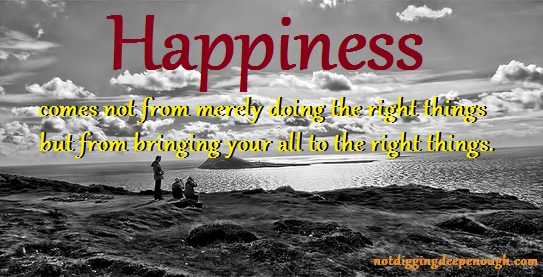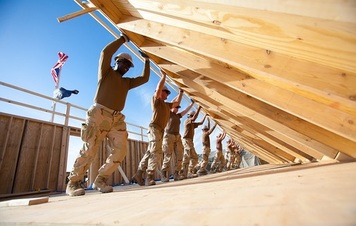 Last week I extolled habits of faith. But faith can be really hard if you’re in a deep hole. How exactly do you have faith when everything around you seems to confirm there’s no hope? Think hope has left you? Think again. There is always hope because there is always Christ. You can go through the motions of active LDS life without the restored gospel ever penetrating your heart. That’s because God respects agency. He won’t enter your heart until you first open it. You must first believe before you receive. But how is that done? How do you believe so much in hope and possibility you feel it deep inside you? Your focus matters  I’ve posted before on how your focus becomes your reality. It’s one of the natural laws that determines whether your life will be miserable or joyful. Life dissatisfies everyone who focus on the negative — what they don’t have, what they aren’t, what they can’t do (or at least what they believe they can’t do). Focus on that long enough, and what do you expect will result? So if you can’t see the light of hope, you’ve simply focused too long on hopelessness. Jesus Christ enables us to cling to hope even when it seems none exists. His light has shone since the beginning. Considering the price He paid for all of us, that light will continue to shine far into the future. You may be thinking, OK, great, but how does that help me to get married? Well, being single is not your real problem. Your real problem is your approach to life, an approach that you have encoded in habit. When your habitual approach has you focusing on the negative, you will feel negative habitually. It’s natural law.  To turn that around, follow the advice of Alma to his son Helaman: “Look to God and live” (Alma 37:47). When you focus on the Source of all faith and hope, He will fill you with faith and hope. And when that becomes habit, you’ll feel that faith and hope habitually. You will come to feel optimistic about your life and your future despite the disappointments of the past or the difficulties of the present. Please understand that focusing on the Savior means more than simply following through the motions of the typical Sunday School answers. It’s not about outward action but inward alteration. Happiness comes not from merely doing the right things but from bringing your all to the right things. When you bring your all to the right things, you direct your focus towards what’s right. That path always leads to Christ, because He is the Author of everything right in the universe. And when you allow Him to enter your heart, He transforms you into everything that is right for you in your life. Step out of your way  One of the largest hinges on the door to our heart is self-talk — the messages that we give to ourselves out of habit. Many singles who feel constantly depressed have habits of negative self-talk. They provide themselves discouraging messages that fix their focus on hopelessness and fear. Do any of these sentiments sound familiar to you? • I can't. • I'll never have the life I want. • Nobody wants me. • I'm so imperfect. • I'm too weak to go on. • Nobody cares about me. Many singles give themselves these messages out of habit. They do it automatically without ever thinking about it. We are truly our own worst obstacle! None of these depressing messages comes from Christ, so when we focus on Him, we can break free of the habit of fear. Focusing on Him means giving ourselves messages of hope and faith — in other words, embracing habits of positive self-talk. How often do you give yourself these messages? • I can. • I will achieve the life I want. • I am wonderful. • I am worth something. • I am so strong I'm unstoppable. • God cares about me. Happiness comes from bringing your all to the right things. Self-talk is a powerful tool to bring your all to those right things. If you feel dissatisfied with your life or bereft of any hope for the future, examine your habits of self-talk. The messages you feed yourself can hold you back from experiencing the joy God wants you to have right here and now. Reformat yourself with habits of positive self-talk and then reboot yourself. Jesus Christ makes it possible to find joy regardless of our circumstances. When you open your heart to him with habits like positive self-talk, His light will help you to see the possibilities that really do surround you. And you can’t help but feel hope and optimism when you see as He sees.
0 Comments
 My grandfather’s funeral made this week challenging. His passing emphasized for me the urgency to get the stories of our ancestors. And it flooded my mind with many memories. I once lived with my grandfather, who let me borrow his car so I could be with my folks for Thanksgiving. When he learned of this magnanimity, my uncle reminded my grandfather of the accident I caused in “the little tan truck”as we all called it. I’ll never forget my grandfather’s reply. “It’s just a car.” This week at the funeral, I learned stories about my grandfather. For example, a good family friend who drove a beat-up pickup once needed to go to Salt Lake City for medical care. This friend telephoned my grandfather and asked if he would care for his horses while away. My grandfather consented then showed up at his friend’s house 15 minutes later. Giving him the keys to his car, my grandfather said that, if his friend would drive his car instead of that old, rickety truck, he wouldn’t need to worry about making the trip there and back. I came to understand how my grandfather could give so generously to me years later. He’d done it before! Most things get easier the more you do them. As Ralph Waldo Emerson once said, it’s not that the nature of the thing has changed but our capacity to do has increased. My grandfather wasn’t ever perfect, but he certainly increased his capacity to do good. The more he tried, the more habitual his devoted service became. Examine your habits  Many of our decisions we make from habit. By design, habits automate much of what we do. But habits have a not-so-great side: Everything around us can change, but our habits will keep us keeping on whether they help or hurt us. I’ve written before about habits in this blog and my upcoming book, especially the first chapter. You can read the first 60 pages for free. But it all comes down to this question: Where are your habits leading you? A life of faith and joy? Or a life of fear and stagnation? When married Latter-day Saints speak insensitively, what’s the first thing we singles want to do? To “defend” our perspective? Or to encourage patience and efforts at understanding? When we feel the pangs of loneliness all singles encounter, how do our habits prompt us to respond? To allow negative emotions to overwhelm us? To give way to doubt and discouragement? Or to believe in God and His ability to strengthen us to overcome all things? When we encounter opposition to our righteous desires for family, where do our habits lead us? Do we join the pity party beckoning at our doorstep? Do we wallow in the mire of disappointment and lost opportunity? Or do we replace negative self-talk with wise words of encouragement and hope in new opportunities to come? Do our habits lead us down the path of faith or fear?
I used to repeat to myself messages of discouragement and hopelessness. I rationalized away this negative self-talk habit as just reviewing the facts. But negative habits always lead to a negative reality. It’s natural law. Only when I embraced positive self-talk did things turn around. That’s natural law too. Do your habits lead to faith? If not, reformat and reboot yourself with new, more positive habits. God is anxious to work a miracle in your life. But faith must come first.
We need each other  My vision won’t surprise long time readers of this blog or anyone who’s read the introduction to my upcoming book. (You can download the first 60 pages for free here.) We need to come together. That’s why I love this line from Sister Burton’s address: Brothers and sisters, we need each other! So true! Yet so infrequently exemplified when considering the singles. That’s why I love Sister Burton’s remark. Accepting that we need each other helps us drop our own agendas and surrender to love. Only by surrendering to love do we build Zion, because Zion can’t be built unless we do it together. Sister Burton continues: As covenant-keeping women and men, we need to lift each other and help each other become the people the Lord would have us become. And we need to work together to lift the rising generation and help them reach their divine potential as heirs of eternal life. We could do as Elder Robert D. Hales and his wife, Mary, have done and follow the proverb "Thee lift me and I'll lift thee, and we'll ascend together." Translation: We’re all on the same journey together. So let’s walk together! That means marrieds supporting singles and singles supporting marrieds. How else do we develop a true unity of the faith?
Oft speak kind words
1. When was the last time I sincerely praised my bishop or stake president, either alone or in the presence of his family? [If we refuse to support our leaders while complaining about our leaders not supporting us, we’re getting what we deserve.] 2. When was the last time I thanked, expressed love for, or earnestly pleaded in faith for the married members of my ward in prayer? [The support we offer can’t be feigned or rote as though checking an item off a to-do list. It must come from a genuine reality deep within us.] 3. When was the last time I stopped myself from saying something I knew could be hurtful? [No adaptation needed here.] 4. When was the last time I apologized and humbly asked for forgiveness—without adding the words "but if only you had" or "but if only you hadn't"? [Again, no adaptation needed.] 5. When was the last time I chose to be happy rather than demanding to be "right"? [Happiness really is a choice, so get your happy on!] Bringing it all (and us) togetherSister Burton concludes her message with these wonderful words: As I have prepared for this opportunity today, the Spirit has taught me, and I have committed to speak words of kindness more often to my cherished companion and about him, to lift the men in my family and express gratitude for the ways they fulfill their divine and complementary roles. And I have committed to follow the proverb "Thee lift me and I'll lift thee, and we'll ascend together." Absolutely! I long for the day when we can come together and be one, when singles everywhere will be not just members of record but members for real. And I know I’m not alone in those feelings.
Yes, I’ll join with Sister Burton in seeking the help of the Spirit to know how we can better lift each other and ascend together. The only question is this: Will you?  General Conference consistently offers great inspiration and counsel. I hoped to post on it, but the texts of addresses aren’t yet available. So we’ll have to wait for that. But we don’t have to wait to consider the blessings of Conference. Every six months we receive a Liahona, as it were. Of that director Alma said, And now, my son, I have somewhat to say concerning the thing which our fathers call a ball, or director—or our fathers called it Liahona, which is, being interpreted, a compass; and the Lord prepared it. Did you catch that? Because the miracles came by small means, the people slacked off and therefore didn’t progress in their journey. Are we singles stifled in our journey because we’ve grown inattentive to the small miracles by which God divines to direct us? And what exactly are those small miracles? Surely Conference is one. But what other Liahonas do we have? Prayer  To improve my prayers, I’ve been studying scriptures about prayer. And I’ve been learning tons. If the quantity of scriptures that reference prayer suggests anything, God cares most about what our prayers contain. Why we pray comes in a distant second place. And the scriptures speak more about praying for others than for ourselves. It’s not wrong to pray for ourselves. There’s just many more scriptures describing or extolling praying for others. My prayer study has humbled me when I consider how oft my prayers revolve around myself. FastingI’ve posted before about a book on fasting written by an author of another faith. He extolled fasting to respond to life events rather than to secure divine intervention. Again, the scriptures support fasting to ask for God’s favor. But just as I found with prayer, many more scriptures describe fasting as a response to a trigger event in life. The intention is not to procure a desired result but rather to near oneself to God. In the time since my post, my fasting has fallen short of that standard. Again, the realization that I’m not where I should be humbles me.
And your minds in times past have been darkened because of unbelief, and because you have treated lightly the things you have received-- If the way before feels darkened, reconsider your approach to the scriptures. Temples  The House of the Lord is a marvelous blessing. We’ve all heard stories about people who lived far from a temple sacrificing greatly to attend. Yet how often do we who live close to a temple make time to attend? If your temple attendance has become rote, I recommend (pun intended) that you change your approach. I found my experience changed when I changed my approach to reflect more fully Psalms 24:3-6. Who shall ascend into the hill of the Lord? or who shall stand in his holy place? By taking the time to wash my hands and examine my heart, I stopped rushing the experience. Now I arrive early to sit and ponder before my session. I’ve found more guidance in the temple by taking this approach. Being still has opened me to instruction I wouldn’t have otherwise received. Patriarchal blessings  My own patriarchal blessing speaks about my marriage and family in this life. After almost twenty years of being home from my mission, I’ve yet to receive those blessings. Of course, I wonder. But I still treat it like the personal scripture it is. I’ve organized it into verses and printed it out to look like pages of scriptures. I placed these pages inside my scriptures. I’ve also included a digital copy as notes in my digital version of the scriptures. Just as with the temple, I've found my approach makes all the difference. And just like prayer and fasting, I find myself humbled by how short I’ve fallen in my attention to this Liahona. I don’t consult it as frequently as I should. Get on track  How diligently are we seeking direction from the small things — the many Liahonas — that God has provided to give us direction? If your answer to that question feels lacking, I have great news. You can get back on track! Focus more attention on the Liahonas God has provided in your life. Each of the Liahonas just discussed can easily become rote exercises if not performed with conscious intent. Autopilot will never lead you to a life fully lived. You must be present in what you do while you do it to tap the full experience available. And part of that full experience is receiving the guidance we all need for our lives. If you’re off track, own your life and get back on track. If your prayers aren’t where they should be, get them there. Likewise if your fasting isn’t where it needs to be. Same for your scripture study, temple attendance, and patriarchal blessing. The Lord is trying to give you the direction you need. Are you trying to hear Him? O my son, do not let us be slothful because of the easiness of the way; for so was it with our fathers; for so was it prepared for them, that if they would look they might live; even so it is with us. The way is prepared, and if we will look we may live forever. (Alma 37:46)  Last week I said you’ve got huge issues if you think the whole purpose of singles committees is to plan activities. I then said that I’d get to that issue later because I wanted to address why we should go after less active singles last. Well, now it’s later. Singles committees should do more than plan activities. Many disagree. They say, “Wait! The Handbook says . . . .” OK, let’s take a look at the Handbook. Before we do, we should understand the Handbook specifies significantly more attention on YSA than SA members. For simplicity, two of my three Handbook quotes come from the SA section. But the concepts are completely transferable. What the Handbook says
Leaders should make special efforts to understand and address the needs of single adults. (Handbook 2: Administering the Church, Section 16.1) How is simply organizing an activity making “special efforts to understand and address the needs of single adults”? To understand needs, you need to know the people with those needs. That means more than just planning an activity. Activities are the means to the end and not the end in itself. Let’s use a fireside (a typical singles activity) to illustrate. Singles firesides often present the gospel in a generalized way. This approach provides little more than a rehash of Sunday School, as though more church were the answer to our problems — not much of a “special effort.” Making “special efforts” doesn’t mean leaders need a separate initiative. They don’t need more work. They just need to work smarter. Continuing with the fireside example, leaders should greet singles warmly and get to know them. All committee members can involve themselves in this effort. Leaders can also encourage committee members to sit with other singles and invite people to sit together. These “special efforts” make a huge difference and don’t require anyone to put another project on their plate. Again, from the Handbook, The stake presidency seeks to understand the needs of single adults and to provide ways to address those needs. (Handbook 2: Administering the Church, Section 16.1.1) Activities don’t “address those needs.” The right approach does. If all we do is reserve space on the calendar, few will care. But if we help individuals feel loved and supported, more will care and even more will want to be a part of that. Filling the gap  Too many seem to justify disengagement with that early phrase about singles meeting their own needs. I’ve advocated repeatedly the need to own one’s life, so I support the concepts of individual self-sufficiency and personal responsibility. Too many singles depend too much on others to do what they can and should do for themselves. At the same time, individuals cannot meet all of their needs on their own. We need to balance individual responsibility with community involvement. In that light I’ve suggested four ways that marrieds can help singles. They apply very well to singles committee discussions and planning. Instead of just doing what’s been done before or picking something just because it’s new, committees should discuss how they will use their activities to meet the needs of individual singles. How can you legitimately claim that your activities meet the needs of individual singles when the names of individual singles don’t populate your meetings or your prayers? I don’t see how you make that case. What I do see is a Handbook saying leaders should seek “to understand the needs of single adults and to provide ways to address those needs.”  Appropriate interaction helps you do that. Activities can provide a wealth of information to inform your committee meetings, but only if you draw it out. These “special efforts” combined with the influence of the Spirit can help you plan more effective activities, which you then use to extract more information to inform future meetings, and the process continues. Marriage is designed to give individuals support and love. Singles don’t have the benefit of that institution. But they have the same need for support and love that marrieds have. Parts of that gap singles can and should fill themselves. But other parts they can’t. And that’s where singles committees can help. The next time you find yourself serving in a singles committee meeting, don’t just complete a template of activity assignments. Plan your activities for the people. Discuss them by name and pray for them by name. Our singles groups can be more than just a checklist exercise if we build networks of support in which everyone ministers to everyone. |
Author
Howdy! I'm Lance, host of Joy in the Journey Radio. I've been blogging about LDS singles life since 2012, and since 2018 I've been producing a weekly Internet radio show and podcast to help LDS singles have more joy in their journey and bring all Latter-day Saints together. Let's engage a conversation that will increase the faith of LDS singles and bring singles and marrieds together in a true unity of the faith.
Comment
Joy in the Journey Radio encourages the free discussion of ideas but reserves the right to remove and/or block comments which do not conform to LDS standards.
Donate
Joy in the Journey Radio offers many free resources to help LDS singles everywhere, but it certainly isn't free! Help Joy in the Journey Radio in its mission to improve the lives of LDS singles by donating today.
Posts by Month
December 2022
Categories
All
|








 RSS Feed
RSS Feed